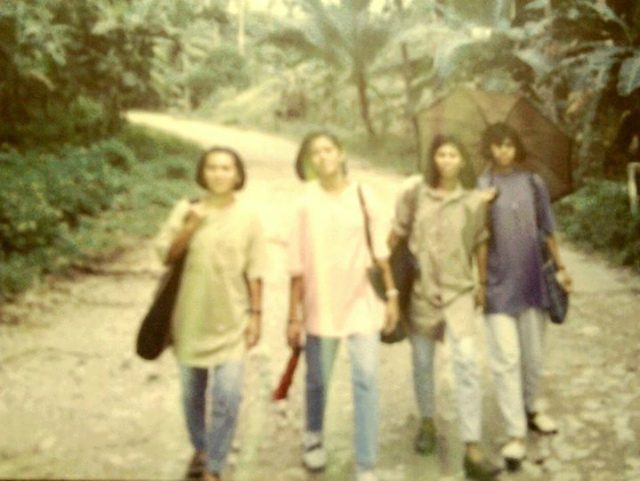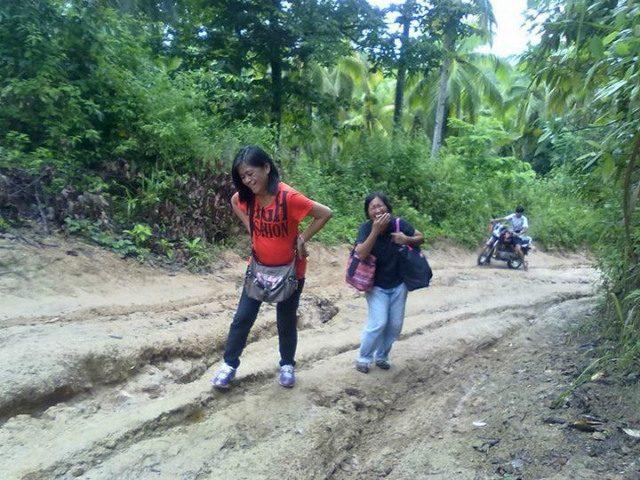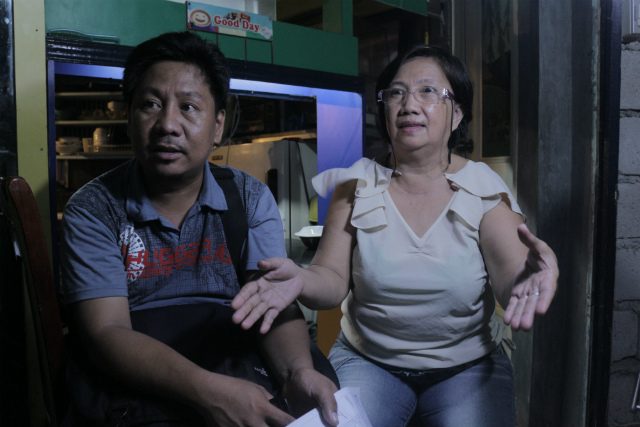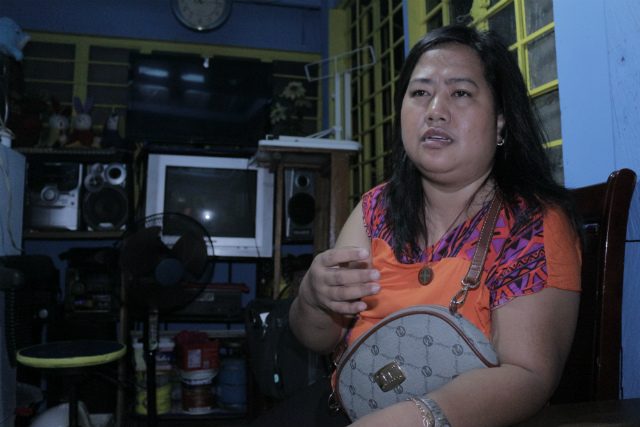SUMMARY
This is AI generated summarization, which may have errors. For context, always refer to the full article.

MANILA, Philippines – In the season of political surveys and campaigns, it’s easy to overlook the people behind them.
While analysts and statisticians crunch the numbers, there are little known wage earners who gather the data.
They enter cities and towns as strangers, walking along unfamiliar streets, counting each house from the predetermined starting point to make sure sampling is accurate and representative. After all, accuracy through a methodical approach is what research or polling agencies are paid and commissioned for.
These data gatherers are called field interviewers, most of whom – like many Filipino laborers these days – are employed on a contractual basis. (READ: House panel tackles job security bills)
Armed with a pen and multiple pages of paper, they knock on doors to ask potential interviewees if they would agree to be surveyed. When they do this, what they’re really asking is whether or not interviewees could make the day’s work a little less tedious.
It is a tireless job, walking along dirt roads, waiting for hours on ports, spending the night at a loving stranger’s home, speaking to local officials and telling them, “No, I am not a spy, no, I am not from a rival clan.”
Lives in danger sometimes
“No, please don’t hurt me.” This was the cry of Gloria Capulong when she was surrounded one day by a group of armed men in a Muslim enclave in Manila while she was gathering data for a political survey.
She said she was detained. For how long, she could not remember.
She said one of the men hit her hard, causing her to fall on the ground with her pen and accomplished survey papers.
She couldn’t know for sure if it was the former or the latter that hurt more – the physical pain of a heavy blow on the head or the emotional pain of seeing her meticulously gathered data disregarded.
One of the men, she recalled, tore the papers.
Political surveys are the hardest to do, according to workers Rappler interviewed, especially in areas where political tensions are high.
Field interviewers would at times be mistaken for rebels when gathering data in far-flung areas.

Most of the field interviewers are women, seen as less intimidating in many communities they survey.
But even men like pollster Jhes Duldulao go through tough times, including having to spend the night in ports and bus stations. This is because pollsters can’t leave a community until the needed number of respondents is surveyed.
This is especially so in island-provinces where having to go home for the night and returning to the community in the morning to continue the survey spells doubled sums appropriated for the trip.
Some locals still doubt and shoo away many of the field interviewers, who have learned the hard way that hospitality is not always a shared trait among all Filipino households or even village officials.
Challenge, growth, constant fun
Depending on the project they’re working on, some field interviewers are paid P12,000 to P15,000 for 15 days without days off.
If projects come one after another, some of them can get even P20,000 in 15 days.
Depending on the size of the base required for the survey, a project’s fieldwork can last from one day to one month.
A political survey usually needs one to 3 days of fieldwork, as the results are usually needed within a week.
Some of these political surveys with one-day deadlines usually take all day until early morning the next day to finish. This means knocking on people’s doors in the middle of the night until the required number of respondents is completed.
“By hook or by crook, hihintayin namin kayo dito (we will wait for you here),” Gloria quoted her superior as saying.

Jhes also said the fieldwork for a political survey that takes until late night to finish also requires specific traits of respondents. One may knock on a door of a house with no women inside, making it a futile attempt if the remaining respondents needed are supposed to be female. Or it could be a family with no children with the age required for the survey.
Sometimes, said Jhes, pollsters spend over two hours in one house just to finish all the questions in one survey.
Gloria said one of the hardest parts of being a field interviewer is other people’s lack of understanding for the work they do. She said she couldn’t count the days when she would be gone for 3 straight days, and her husband would not believe it was for work.
Despite the challenges, both Jhes and Gloria have done their work for years, admitting that the job provides them growth and excitement that a regular job that requires spending all day behind a desk cannot. Gloria has been a field interviewer for 17 years now.
“‘Yun bang marami kang matututunan ba, additional na kaalaman kasi iba-ibang project. May mga lugar na napupuntahan mo, masaya, exciting. ‘Yung makarating ka sa isang lugar, kahit mahirap ‘yung trabaho, masaya na rin po sa amin,” she said.
(You learn a lot, acquire additional knowledge because of the variety of projects. There are places you reach which are fun, exciting. When you reach a new place, even if the work is hard, that still provides us happiness.)
Jhes, for his part, said he prefers a job where there is constant learning. He said he has a fascination for news and social issues, making the work of a field interviewer appealing to him.
Pollsters are trained before being granted projects they go on fieldwork for. They also have a yearly refresher course. Prior to a project, they are briefed about the requirements of the survey, which, along with projects they are working on, are regarded as highly confidential.

Field interviewer Melijane Beguiras said most of the respondents they interview offer food or sometimes a night’s rest in their homes, making most of their trips bearable, if not fun.
The toil is also made bearable by the friendships cultivated with fellow field interviewers, who understand the challenges of the job.
Meaningful work
Author Barry Scwartz suggests that a paradigm shift is needed in the way employers look at why people work.
Instead of looking at work as pay-driven, he argues that the value of a worker’s output must be seen through the lens of the people who will benefit from it.
“Of course, we care about our wages, and we wouldn’t work without them. But we care about more than money. We want work that is challenging and engaging, that enables us to exercise some discretion and control over what we do, and that provides us opportunities to learn and grow,” he wrote for the New York Times.
“We want to work with colleagues we respect and with supervisors who respect us. Most of all, we want work that is meaningful – that makes a difference to other people and thus ennobles us in at least some small way,” he added.
For Gloria, what propels field interviewers like her is the idea that somebody somewhere needs the data in their hands.
Most of the surveys conducted throughout the year are consumer surveys, said the field interviewers Rappler spoke with.
The results of these consumer-based surveys aid many corporate giants in product development, advertising strategy, and general assessment of current products to determine drivers of purchase, brand value, and other key performance indicators.
These are ideas that can propel a company, if not an industry, forward. Ideas that help companies thrive, generating more jobs in the process.
There are also the surveys that attempt to document public sentiment on pending legislations, providing a peek into the pulse of the masses and enabling concerned officials to adjust policy direction when necessary.
Academics also benefit greatly from the work of field interviewers, giving their studies the needed basic premises and/or supporting proof for their conclusions.

As for political surveys, Filipino political scientist Edmund Tayao stressed that these are important tools candidates use to strategize in their campaigns.
“Political surveys are imperative to an election campaign as they allow the party or candidate to determine which socio-economic sector and/or geographic area the candidate is weak,” he explained.
“Based on this, the campaign may be adjusted to focus on these weak areas and hopefully turn the tide,” he said.
Tayao also highlighted the arduous process needed to complete even just one survey.
“[S]urveys in the Philippines require face to face interviews that take weeks to complete,” he said.
Survey data
Gloria still cries when recalling her regrettable experiences gathering data.
When Gloria was detained after one such fieldwork, another woman who was based in the community she surveyed at the time helped her escape.
She made sure she had collected every torn piece of her survey papers. She said she had to. The project was due. The client had contracted her company to deliver the numbers.
Having escaped, she slowly pieced the torn survey papers together and went home in tears. She was in shock, she said. Still is, to this day.
All in the name of survey data. – Rappler.com
Add a comment
How does this make you feel?
There are no comments yet. Add your comment to start the conversation.